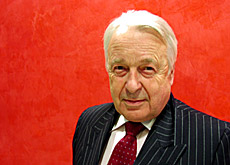
Switzerland faces ambiguous role in enlarged EU

Now the European Union has expanded, Switzerland risks becoming less important in the eyes of some neighbouring countries, says Franz Blankart.
The official who led Swiss negotiations over the European Economic Area (EEA) talks to swissinfo about the likely impact on Switzerland of a larger EU.
On May 1, as the EU grew to include ten new members (eight of them from the former Soviet Bloc), Switzerland was still locked in negotiations with Brussels over a second set of bilateral accords.
Even once these are concluded they could still be put to a popular vote.
Blankart, a former state secretary for economic affairs, warns that the ambiguous position Switzerland has taken on the EU is not sustainable in the long term.
swissinfo: Is Switzerland, which was at the heart of Europe, now on the periphery?
Franz Blankart: That’s clear, just as it is clear that Germany will now be at the geopolitical centre of the European community.
swissinfo: Is Switzerland heading for further marginalisation or will there be growing pressure on the country to move closer to the EU?
F.B.: For certain countries, such as Germany, we are no longer as important as we were before the fall of the Berlin Wall. We have to live with that. We are less important for the EU, but on the other hand an important market has opened up for us and this will definitely have economic advantages.
swissinfo: Enlargement has caused some concern in Switzerland, particularly over the free movement of people, which worries leftwing trades unions as much as rightwing politicians. Is this concern well founded?
F.B.: No, I don’t think so, because a free movement of workers doesn’t mean a free exchange of unemployed workers. It opens the way for businesses to bring in the specialist staff they require.
‘Free movement’ means ‘to be a candidate for a position that is available’ and if the person in question doesn’t get the job, they have to return to their country of origin.
Economists estimate that just one per cent of the working population of the new EU members will leave their country to live in another EU country, in the EEA or Switzerland. That’s not many people.
swissinfo: A referendum may be launched over Switzerland’s bilateral agreements with the EU. Do you see that as confirming your view that the bilaterals were never the best solution?
F.B.: It was the only possible political solution after the Swiss rejected plans to join the EEA [in 1992]. Of course the EEA was a less expensive option and offered more than the bilateral accords, but it’s the price we have to pay for turning down an opportunity.
swissinfo: What do you expect to happen in Switzerland after the second set of bilaterals is concluded?
F.B.: There is a possibility that the bilaterals will go to a referendum. After that Switzerland will have to decide, one way or another. Either it heads full-speed towards EU membership or it withdraws its application to join.
I don’t think we can live with this ambiguity in the long term – the ambiguity of a country that hands in an application for EU membership but in reality doesn’t want to join.
swissinfo: The Berlin Wall fell 15 years ago. Now eight ex-Soviet Bloc countries have joined the EU…
F.B.: It really marks the end of the Second World War. In his [postwar] plan, General Marshall offered aid to European countries on condition that they worked together within the Organisation for European Economic Cooperation (now the Organisation for Economic Cooperation and Development).
At the time, the USSR banned its satellite states from taking part. Today, however, they are able to join the European community. It’s obviously an important historical moment.
swissinfo: You have said that “our future is Europe, a federalist Europe for historic not economic reasons…”
F.B.: Yes, but this will take some time. For our adhesion to be credible, it must come from a groundswell of interest among the population: a will to contribute to European politics.
swissinfo: The question over whether to join has been raised again recently – notably in connection with pressure from Europe in past months and the stagnation of the Swiss economy. Are these bad reasons for joining?
F.B.: A sense of fatalism, a wish to avoid queues at the Swiss-German border or discrimination, these are not good enough reasons for joining the EU.
swissinfo-interview: Bernard Léchot
Franz Blankart:
1970-73: First secretary at the Swiss mission to the European Commission (EC).
1973-1980: Head of the Integration Bureau at the Swiss foreign ministry.
1980-1984: Plenipotentiary ambassador in Geneva, in charge of European Free Trade Association (Efta) and the General Agreement on Tariffs and Trade (GATT) membership.
1986-1998: State secretary in charge of EC and EFTA negotiations on the European Economic Area.
Currently an associate at the Banque Mirabaud in Geneva.

In compliance with the JTI standards
More: SWI swissinfo.ch certified by the Journalism Trust Initiative



























You can find an overview of ongoing debates with our journalists here . Please join us!
If you want to start a conversation about a topic raised in this article or want to report factual errors, email us at english@swissinfo.ch.